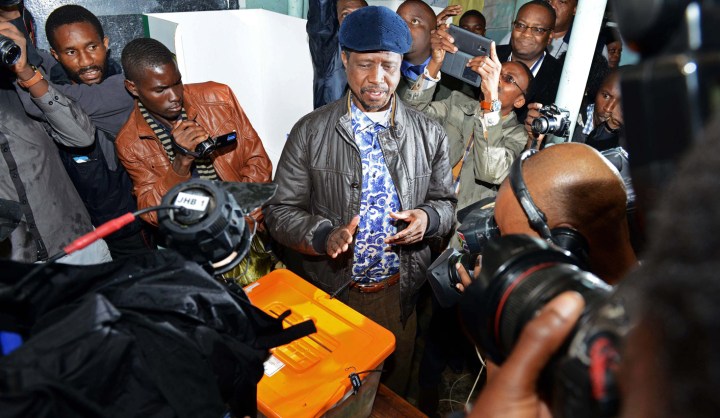Africa
Zambian elections: ‘There’s no honeymoon’ for Edgar Lungu

By the narrowest of margins, Edgar Lungu won the Zambian presidential election and was sworn in as president on Sunday. The new man faces several daunting challenges, and just a few months in which to meet them. By SIMON ALLISON.
In Zambia, it is day one of Edgar Lungu’s short term and already the new president has plenty on his agenda – and he knows it. “There’s no honeymoon for us,” he told the crowd gathered in Lusaka’s Heroes Stadium on Sunday for his inauguration, which included the heads of state of the Democractic Republic of Congo, Namibia and Zimbabwe.
He promised to get on with business quickly. “Politics is not about winning and celebrating. It’s about meeting the aspirations of the people. I’m humbled you elected me as sixth Republican President. You are my masters, I’m your number one servant,” he said.
Top of his agenda is appointing a new cabinet, which he said would be named by Monday. He has already filled the position of justice minister with Dr Ngosa Simbyakula, a lawyer and home affairs minister in the Sata administration. Simbyakula is tasked with pushing through a new constitution, the draft of which has been stuck in the review process for several years. It will be interesting to see what this draft looks like when it emerges for public approval – specifically, whether it succeeds in curbing the power of the president and keeps the draft clause about presidents needing to be elected with an absolute majority.
This latter clause could be important because Lungu’s election win was by the slimmest of margins. He received 48.33%, compared to main rival Hakainde Hichilema’s 46.67% – a difference of just 25,757 votes. If Zambia does impose some kind of run-off mechanism in time for the next election in 2016, this might work in Hichilema’s favour. But if the new constitution (provided it is approved) retains the current electoral process, then Lungu risks being accused of governing in his own self-interest.
The other pressing task in Lungu’s inbox is a decision about whether to retain or discard the new mining royalty, which was raised from 6% to 20% during Guy Scott’s stint as interim president. Mining companies and investors have been universal in their criticism of this decision, arguing that it will discourage investment and sharply decrease copper production – the commodity on which the economy relies to an unhealthy degree. On the other hand, the government is desperately short of money and needs the increased revenue to keep the civil service functioning. Can Lungu find some kind of compromise? And can he do so in time to present a success story at the next elections, due in 18 months or so?
The proximity of the next vote will no doubt impact Lungu’s presidency, which already feels like little more than an extended campaign stop. Even his inaugural speech came with barbs towards his opponents and pointed gratitude to key supporters. “Some of our colleagues stooped so law to appeal to tribalism but we must realise that we are one family and move forward,” he said, in a veiled reference to Hichilema. “We must work hard not through dazzling rhetoric but hard work to fight [poverty],” he said later, another subtle dig, this time at Hichilema’s reputation as a fine speaker (compared to Lungu’s rather more dour approach).
For his part, Hichilema has not accepted defeat gracefully. “A stolen election does not reflect the will of the people and is not going to deliver,” he said. “It is with deep regret that we now already know the predetermined result.” Hichilema maintains that the vote was rigged, but has yet to offer any convincing proof. If he does challenge the result in court, the ensuing legal battle will be lengthy and any result may only come after the next election anyway.
Meanwhile, Lungu was careful to thank former President Rupiah Banda, whose endorsement of Lungu was probably the difference between winning and losing, given how close the result was. It also proved to be a devastating blow for Banda’s own Movement for Multiparty Democracy, whose candidate Nevers Mumba came a humiliating fourth position with just 14,609 votes. Most observers expect Banda to be rewarded in some way, possibly with a cabinet post.
For all politicians, however, a bigger worry must be the shockingly low turnout figures which seem to indicate that most Zambians don’t really care who occupies State House. This election witnessed the lowest turnout in Zambia’s history, with just 32.36% of registered voters bothering to turn up.
Yes, Zambians can be proud that their country is one of Africa’s strongest democracies, but they are also one of the least engaged electorates on the continent – hardly a vote of confidence in the political system. DM
Photo: A handout picture provided by the South African Government shows Zambian Presidential candidate and Patriotic Front (PF) leader, Edgar C Lungu (C), casting his vote at a polling station in Lusaka, Zambia, 20 January 2015. EPA/JACOLINE SCHOONEES/GCIS
Read more:
- Lungu wins Zambia’s disputed presidential race from AFP


















 Become an Insider
Become an Insider